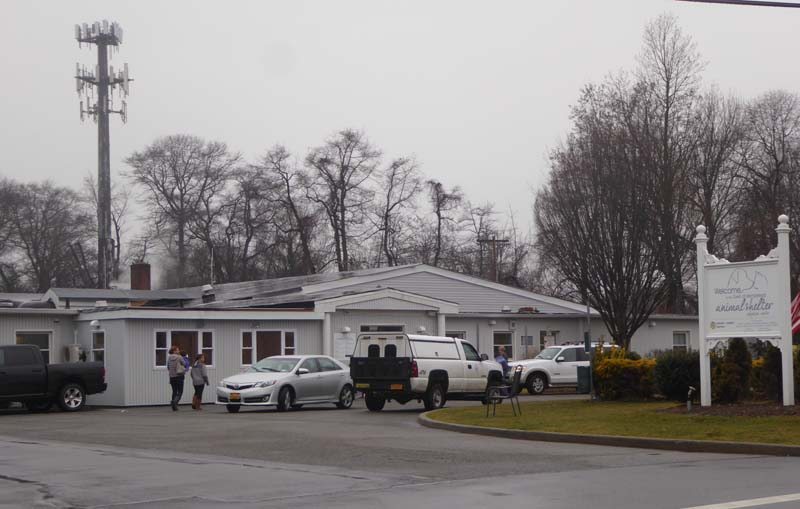
Town: It passed state inspection
Though it takes up less than 1 percent of the town’s $436 million 2017 budget, the Town of Hempstead Animal Shelter (TOHAS) accounted for 100 percent of the public comment period at the Jan. 10 board meeting.
Most speakers had critical words about the center’s operations and guiding philosophy under its director, Mike Pastore, who has served since 2014.
The town, as of press time, has not responded to a request by Anton Media Group to interview Pastore and be given a tour of the shelter.
”We need animal-friendly people,” said Stephanie Capuano of Wantagh, where the shelter is located at 3320 Beltagh Avenue. Taking aim at Pastore, she stated, “What right does he have to decide who should live or who should die? We have animal cruelty laws here in {the state] and {Pastore] is not even abiding by these laws. And I’m going to keep on {coming here] and speaking until we have a shelter that we want.”
Going double past the three-minute talk limit, Capuano concluded, “I tell people, ‘Don’t go there. Don’t relinquish your animal [at TOHAS]. They’ll just kill it.’ [For] $4 million a year, we need to do better.”
Keri Esposito traveled from Blue Point to read a statement from Christine Napoli, a shelter volunteer. Five years ago, Napoli related, “it was a shelter to be proud of, and that was due to the life-saving management….For the first time in history, the shelter was on the same level as the surrounding shelters that were spoken of so highly.”
But under Pastore’s leadership, Napoli went on, “one by one, I’ve watched the most dedicated people leave. Staff was cut back and unhappy, and programs that were in the works were stopped in their tracks.
“What I can’t abide the most is the killing of adoptable animals,” she added. “Euthanasia is only necessary for animals who are suffering and terminally ill. Pastore does not euthanize—he kills unnecessarily—and the animals, staff and volunteers are suffering for it.”
DiNapoli affirmed that she chose to volunteer at the shelter because she cares deeply about the animals. “Please find someone who knows how to effectively run a shelter and treats the animals as living creatures and not inventory,” she pleaded.
Susan Cools of Baldwin praised board members for their commitment to the community. After stating that there were issues that they might not be able to solve, Cools observed that the shelter “is a place where you can make a difference. This place has potential to change a lot….not just the lives of the animals but for the lives of the people who work there. This is probably one of the easiest problems to solve. Please do it. Please help us.”
East Meadow’s Pat Miller, a TOHAS volunteer, had a brief statement for the town leadership. “This shelter with its enormous budget truly needs to be cleansed and restored,” she said. “Restore the staff. Restore the volunteer program. And restore ethical relationships with ethical rescues.”
Bill Nussbuam asserted that, as a TOHAS volunteer working with the cats, he had not seen any of the supposed problems critics were claiming.
“I just want to put a positive note,” he said. “People come up to me, and ask why I would want to volunteer there. I see nothing wrong.”
Councilman Bruce Blakeman interjected to thank Nussbaum for coming forward, observing, “I’ve heard the same thing from many people. The job that’s been done at the shelter is very well. The animals are being well taken care of. And there are kind, compassionate, animal-loving workers.”
David Bernacchi runs the Pets4Luv adoption agency in Westbury and expressed frustration with his experience volunteering at TOHAS. “It doesn’t seem to be run properly,” he stated. “So I don’t know what info is being told to you, as opposed to what is being done [at TOHAS] most of the time. The programs put in place—most are good ideas, but are not being run correctly.”
When Barbara Thomas sat down to speak, and Supervisor Anthony Santino asked for her address, she demurred, claiming that she had received threats and her character had been defamed online.
“We care about the animals. That’s why we are here,” she said. “Without a behaviorist, without the proper people in place, you’re not caring for these animals the way they should be cared for.”
Thomas also took issue with previous public statements from the leadership that the shelter was no-kill. “It’s not true,” she asserted. “And I’m really begging you, at the beginning of 2017, to take us all seriously.”
Catherine Payne of Seaford said she was a concerned citizen who was educating herself on the town’s pressing issues. She had taken a tour of the shelter and “found some positive things there,” she said. “But when I got home, I called my sister and told her, ‘If anything were to happen to me, my three dogs [should] not wind up at the shelter.’ Not that’s it’s a cruel place, but it’s an institutional place. And knowing my dogs, they would shut down in 24 hours and never get adopted from there.”
Payne made mention of a pending lawsuit involving the shelter operations, noting that “it will cost the town money to defend what is morally indefensible [and that] is disturbing to me. The money that is going into that lawsuit should have gone into the shelter.”
For Payne, “any shelter that kills animals who are not terminally ill and suffering is not a real shelter,” and suggested that the problems stemmed from its leadership.
Richard Watkins said he’s lived in the town since the early ’50s and was familiar with its politics and history.
“The shelter has jumped the shark,” he began, using a pop culture expression denoting anything that has gone downhill. “I never wanted to be an animal advocate, never had any interest…until animal advocates reached out to me.”
Watkins runs a Facebook page named “Open Nassau” and was outraged over attacks on animal advocates posted on it.
“These people work for you,” he charged, looking at the board. “They create false personas, false Facebook pages….We can trace them. I can get it done in one or two days. It’s a lot of work [but] they crossed the line yesterday and I’m definitely going to do it. Can you stop [the attacks]? Can you control your people?”
An exchanged with Town Attorney Joseph Ra ensued where the two argued over whether it was in fact town employees who were behind the attacks. Ra stated that Watkins had no proof.
Watkins responded that he could easily find out.
“Stop doing it,” he said. “And leave these people alone and keep your employees under control.”
Watkins’ parting words were, “I’ve had it.”
Felix Procacci of Floral Park expressed frustration over not getting information about the town’s “Storytelling Program for Dogs” program. It was announced in September as a way for volunteers to read to the dogs at the shelter. “According to the American Society for the Prevention of Cruelty to Animals (ASPCA), reading helps pets become accustomed to new people and experiences,” reads a press release from the town. “A soothing voice and presence can calm agitated or fearful dogs, which helps them more easily transition and eventually find homes….Students who participate practice the skill of reading and enhance their reading ability.”
Procacci asked if the program was still in existence, noting that it was, echoing Councilman Anthony D’Esposito’s speech from earlier that evening, “work worth doing. But you won’t talk about it.”
“Submit your request in writing,” Ra replied.
With his voice rising, Procacci exclaimed, “I did. How many times do I have to submit it?”
Santino warned Procacci to “please keep your voice down. Please control yourself.”
Procacci said he received surveillance video from the shelter via a FOIL request, and had some questions about what he perceived to be gaps in the tapes. But again, he could not get answers, despite what he said were numerous written inquiries.
“We’ll respond to you in writing,” Ra stated.
“When?” Procacci yelled as he got up from his seat.
Shelter Passes Inspection

On Jan. 13, the town put out a press release titled “Town Animal Shelter Earns Top Marks in NYS Inspection.”
Supervisor Santino said the shelter “earned perfect grades during the most recent state inspection of the facility. The shelter graded ‘satisfactory,’ the highest rating given in the report.”
Further, “The Municipal Shelter Inspection Report, conducted by the New York State Department of Agriculture and Markets Division of Animal Industry, cited that the…[shelter] is safe, clean, well-lit, well-ventilated and has adequate space available for all dogs.”
Added Santino, “I would like to commend our town’s dedicated animal shelter staff and volunteers for their commitment and dedication to our shelter animals, and helping to keep our shelter in top-notch condition each and every day. As always, we encourage residents to adopt, not shop, at the Town of Hempstead Animal Shelter when seeking a new furry friend to join the family.”
Anton Media Group could not learn why the report was not publicized soon after the inspection, which took place last September. Town spokesman Mike Deery responded, via email, “Honestly, the report just came to my attention. It is the most recent report.”
Diane Madden of East Meadow has been a longtime animal advocate and former TOHAS volunteer who has tangled with the town over what she calls the shelter’s deficiencies. In December, she filed her second lawsuit in six years against the town, claiming it has harassed her and violated her civil rights. A similar lawsuit filed in 2010 resulted in a judgment against the town in 2013.
“Instead of rectifying mounting complaints from his constituents, Supervisor Santino continues to focus on damage control by releasing last year’s news,” Madden said in a statement. “Since being elected he’s promised to hire a qualified behaviorist and to date has not done so. He has also promised to conduct a legitimate internal investigation in response to the countless public complaints about the shelter, yet after 60 constituents have been interviewed he refuses to report any findings. Even at the minimal standards required by Agriculture and Markets, the shelter would not even be able to pass. Animals have been adopted or euthanized before their legal hold times and dogs have been sent out of state at an additional taxpayer cost to facilities which have failed similar state inspections. Taxpayers have been footing the bills for a $4 million dollar animal shelter for decades where the facility is being used for a political ATM machine rather than a safe haven for abandoned pets.”
Lucille DeFina of Merrick is also a former TOHAS volunteer. Along with Madden and Frances Lucivero-Pelletier of Levittown she filed the 2010 lawsuit after the three were banned from the shelter for what they claimed was retaliation for speaking out against the abuse and neglect.
In a statement, DeFina claimed that the state “still has extremely low standards and makes it almost near impossible for a municipal shelter to fail its inspection. They do not look at recordkeeping, policies and procedures or euthanasia records, which ultimately differentiate a good shelter from the bad by today’s standards. Since 2014…TOHAS lacks no-kill life saving policies…and has allowed poor recordkeeping to manipulate euthanasia records. Many cats/kittens appear to have suffered and been deprived of medical attention and dogs have been killed for aggression and blame has been put on the owners.”
Felix Procacci has also clashed with town officials over a wide range of issues and maintains video recordings of complete board meetings at justthefactsmedia.com.
“The New York State inspection includes only the basic operations,” Procacci said via email. “For example, the shelter’s adoption and euthanization records are not considered in the inspection and these are the records which measure the true effectiveness of a shelter. Also, [TOHAS] has been without a behaviorist since September 2014 (which is critical to placing animals).
“Hempstead residents should expect more than just meeting the state’s minimum requirements, especially when their tax dollars are being used to pay an average of $11,000 per year to house each animal at the shelter,” Procacci added.
Procacci’s figures could not be confirmed. In response to a state controller’s audit of the shelter in 2012, the town argued that the controller’s “cost per animal shelter” figures were skewed. The state agency had compared its operating costs to the animal shelters in the towns of Islip and Brookhaven.





























